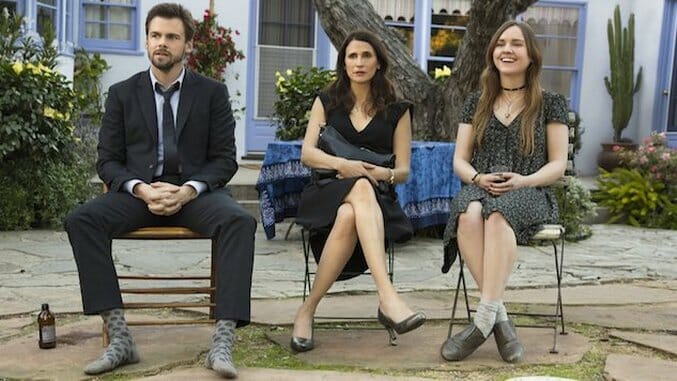How Casual Became One of TV’s Most Poignant Family Portraits
Photo: Greg Lewis/Hulu
In “Things to Do in Burbank When You’re Dead,” one of a handful of standout episodes from Casual’s third season, adult siblings Alex (Tommy Dewey) and Valerie (Michaela Watkins) return home for the night to spread their father’s ashes. As directed by Carrie Brownstein, working in some stretches with a single camera operator and a lone globe lamp, it bears a certain resemblance to Richard Linklater’s Before trilogy, coiling and uncoiling to the conversation’s tempo, though it’s a wordless sequence in a moving car that captures the series’ precise sense of kinship. Riding in the rear of an Uber, brother and sister each grab an earbud to hear Lionel Richie and begin to move, unembarrassed, to the strains of “All Night Long.” It’s the sort of intimate, otherwise invisible moment—like a secret handshake, or a treehouse code—on which Casual turns, and which has made it one of TV’s most poignant family portraits.
Part of Hulu’s growing slate of strong comedies—including Difficult People, The Mindy Project’s post-FOX iteration, and Australian acquisition Please Like Me—Casual, created by Zander Lehmann, might appear all-too-familiar: Its title card apes the drop-down box of relationship “types” one finds on most dating sites; its characters, affluent, white, often self-destructive Angelenos, are kissing cousins to those of HBO’s Togetherness or FXX’s You’re the Worst. Over the course of three seasons, however, Casual has distinguished itself from its competitors by refusing to turn the focus from its central relationship, which is neither a whirlwind romance nor an unhappy marriage. Its treatment of Alex and Val’s thorny, idiosyncratic, affectionate, unconditional bond is both recognizable and sui generis.
“I think the trick to family is, you can say the nastiest things to one another and then the next day say the sweetest things to one another,” Dewey says, reflecting on his own “crazy big,” tight-knit web of half- and step-siblings. “There’s something about the permission you give yourself to unload on a sibling knowing that they’ll forgive you.”
Leaning on the writers’ personal experiences and the close friendship that’s developed between Dewey and Watkins since their first screen test for the series — “They sort of act like siblings when the cameras aren’t on,” Lehmann says — Casual balances on a tonal knife’s edge; both its humor and its emotion are situational, residing in the long silences and unspoken resentments that emerge in even the closest families. With only 29 pages per script, three main characters—including Val’s teenage daughter, Laura (Tara Lynne Barr)—and a host of friends, lovers, exes, and estranged parents, the series’ style is often quite spare, reflecting the shorthand by which we communicate (or fail to) with our families.
“There’s no fat on that bone. We just trim, trim, trim. Any time Zander felt like we were stating the obvious, that line was gone,” Watkins says, referring to the Season Three entry, “Venus,” that she co-wrote with Dewey. She describes one scene in particular, in which Val attempts to apologize to Laura by cooking her breakfast and Alex does the same to Val by dropping by with donuts, as “a mindfuck to write”: “Nobody’s saying anything that they’re wanting or feeling or doing,” she notes. “Everything is subtext in that scene. It’s just wild.”
Even sequences that another series might italicize, Casual prefers to soften; Barr jokes that she brought “a few steps,” “a vibrato” and “some runs” to the set for a scene in which Laura sings “Landslide” for an audience of one, only to keep them in her back pocket.
“My Dad texted me after he saw the episode,” she says. “It was some backhanded compliment, but I really did take it as fully a compliment, because he said something like, ‘You didn’t sound perfect. You didn’t even sound all that great. But it would have been weird if you had.’ I’m glad that came across. It was intentional.”
Still, Casual’s commitment to the subtleties of family life—the almost imperceptible gestures of love, loyalty, frustration and fear that suffuse the relationships among the trio of protagonists, continually shaped and reshaped by the other people that come into their orbit—heightens its keen style and unorthodox structure, rather than diminishing it. Season Three, which features a bottle episode with an animated sequence (“The Rat King”) and a flashback episode (“99”) in addition to “Things to Do in Burbank When You’re Dead,” is the series’ most ambitious to date. From the first episode, “Ashes to Ashes,” in which Val learns at his memorial service that her father is not in fact her father, and thus that Alex is her half-brother, the characters begin to diverge—a challenge that Lehmann sees as part and parcel of the series’ maturation.
-

-

-

-

-

-

-

-

-

-

-

-

-

-

-

-

-

-

-

-

-

-

-

-

-

-

-

-

-

-

-

-

-

-

-

-

-

-

-

-








































